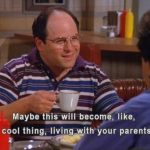High School Reunion Effect: Being Cool, Not All It’s Cracked Up To Be

Joseph Allen, a psychologist at the University of Virginia and the study’s lead author explains: “We call it the high school reunion effect. The student who was popular and was running with the fast crowd isn’t doing great later on.”
According to NPR, researchers followed over 180 13-year-olds for a decade, interviewing the teens themselves, as well as their parents and friends.
“By age 22, the cool group had a 45 percent higher rate of problems related to alcohol and substance use (such as missing work and driving drunk) than their less-cool peers, according to the study, which appears in the journal Child Development. The popular crowd was also more likely to have engaged in criminal activity.”
Allen adds that “by 22 they [the ‘cool kids’] were seen by their peers as being less socially competent and less mature.”
The study participants attended both urban and suburban public schools in the southeastern part of the United States. Researchers also took into account influences that gender and family income might have had on the conclusions.
“Part of the problem,” says Allen, “may be that as these cool kids grew older, they felt the need to do increasingly extreme things to get attention. But their friends, as they get more mature, are less and less impressed by those behaviors.”
Is Media To Blame?
The study’s authors did tend to cast some blame on media and popular programming aimed at kids in the affected age groups. Shows like The Vampire Diaries, Pretty Little Liars, and even older films like Rebel Without A Cause, were cited as examples of “being cool” shown in “glamorous terms.”
“What the media does, I think, is it portrays this fast life in very glamorous terms. [It] sets up an expectation that teens should be acting older,” Allen said.
Of course, in pointing the finger of blame at media outlets and not saying anything about parental factors, the study does itself a disservice.
(Why does no one want to blame parenting for kids’ damaging behaviors? That’s a question best explored for another time.)
In the case of the study, there’s no reason to think that Allen and his team are wrong, particularly if you’ve survived high school and seen firsthand the failures of the people who resemble “the cool kids” the findings describe.
But let’s take a moment now to explore the two biggest factors for these kids’ later-in-life failures: parenting and failure to take personal responsibility.
Parenting
Teachers only have students for about one or two hours per weekday. That’s very little time to have any kind of preventative effect. Sure, a teacher’s influence can follow a child throughout life, but it’s unlikely to help a child more than the people who have them the rest of the days throughout the year.
In a perfect world, kids are with their parents much longer than the average science or math teacher. They begin learning from their parents from an early age, and they also discover what they can get away with.
A “cool kid” suffering the high school reunion effect is comparable to a wild dog on a leash that no one is holding. Sure, the “proper restraint” is there, but it isn’t being used in any kind of a way to prevent bad behaviors. And ultimately, it’s the dog’s master who is responsible for the mayhem that he gets in to. Not teachers. Not principals. Not superintendents. The parents.
But this responsibility of the parent only goes so far. At some point, the child owns it, and that brings us to:
Failure To Take Personal Responsibility
Juvenile offenders may be coddled by the justice system to a sickening degree, but at some point, they’re going to be flying solo, and the choices they make will be theirs and theirs along to take responsibility for. If they’re unwilling to do it because they haven’t been taught to do it by their parents, that’s too bad. It’s just the way our society operates.
But here’s the thing: we live in a country that provides free public education to any and all children. The examples of what it means to be personally responsible are there, even if they’re not at home. Mankind has found its way over thousands and thousands of years of personal history, and they’ve managed to do it regardless of their limitations. There is something innate about right and wrong and personal responsibility. Our biology causes us to mature in a way that we come to learn and understand responsibility and the repercussions of not taking it.
Before we blame Pretty Little Liars or any other show for glamorizing, it’s important to take a hard look in the mirror and place the blame for these findings where it so clearly belongs: firstly, the parent, and secondly, the child.
So Does Being Cool Guarantee That You’ll Grow Up To Be A Loser?
Unequivocally, no. According to Allen, teens should be aware that focusing too heavily on appearance and social hierarchies can be unhealthy, and parents can help by encouraging their teens to aim for fulfillment in the long term over short-term popularity.
“The quiet, not-so-cool kids do well in the long term,” Allen says. “I would say I was part of the not-so-cool kids.”
So parents, focus less on ensuring that your child is a social butterfly and more on teaching them the importance of learning and working toward the completion of worthwhile goals. Students, forget what the lamebrains in the back of the room are doing and focus on the work. It will pay off. The science here “proves” it.
Don’t wait until the high school reunion effect kicks in to take meaningful action. Best of luck as you enjoy some time off this summer. Make sure you use it as a time to learn who you are and challenge yourself intellectually.
[Image courtesy the film Mean Girls]








